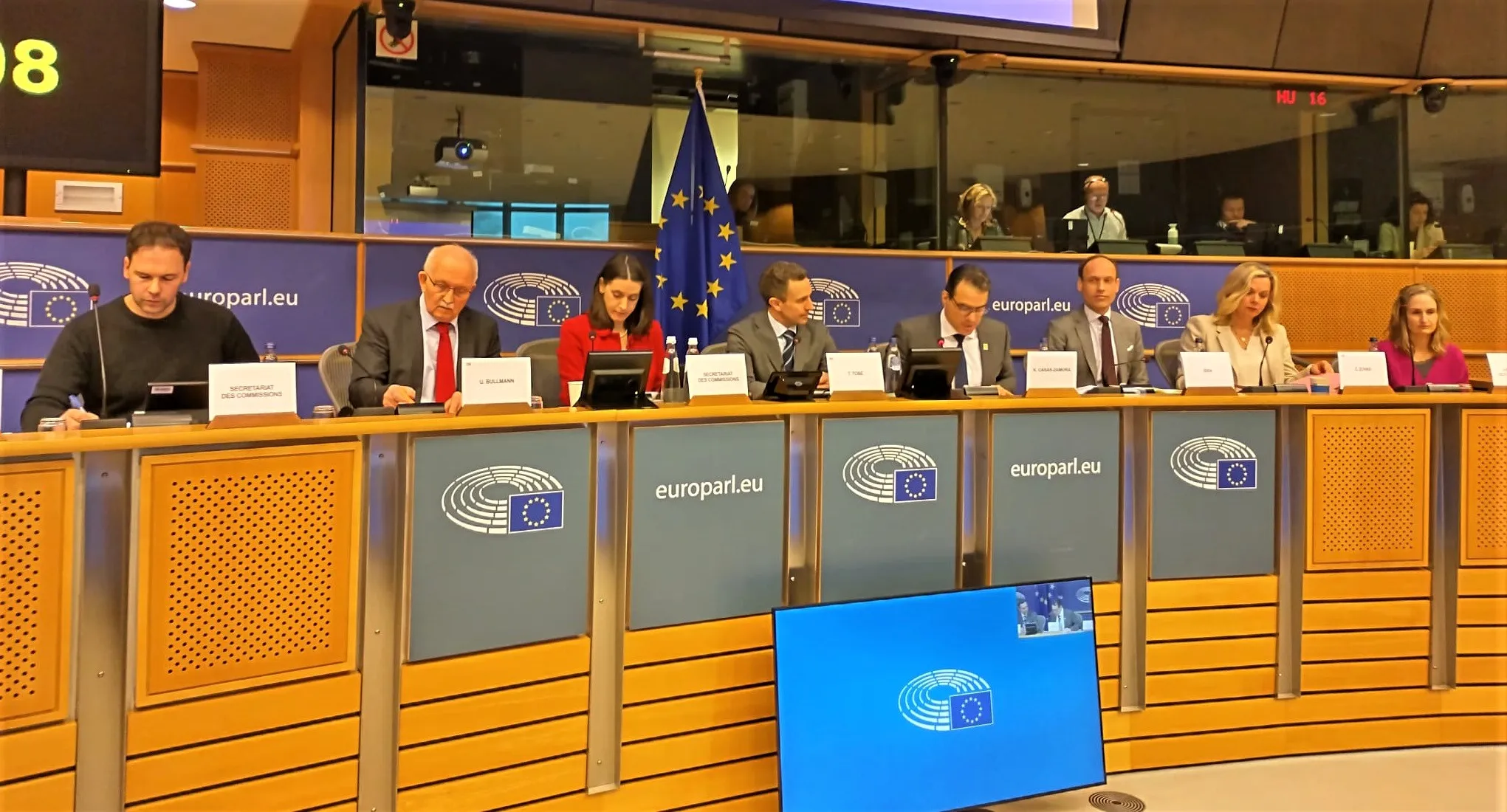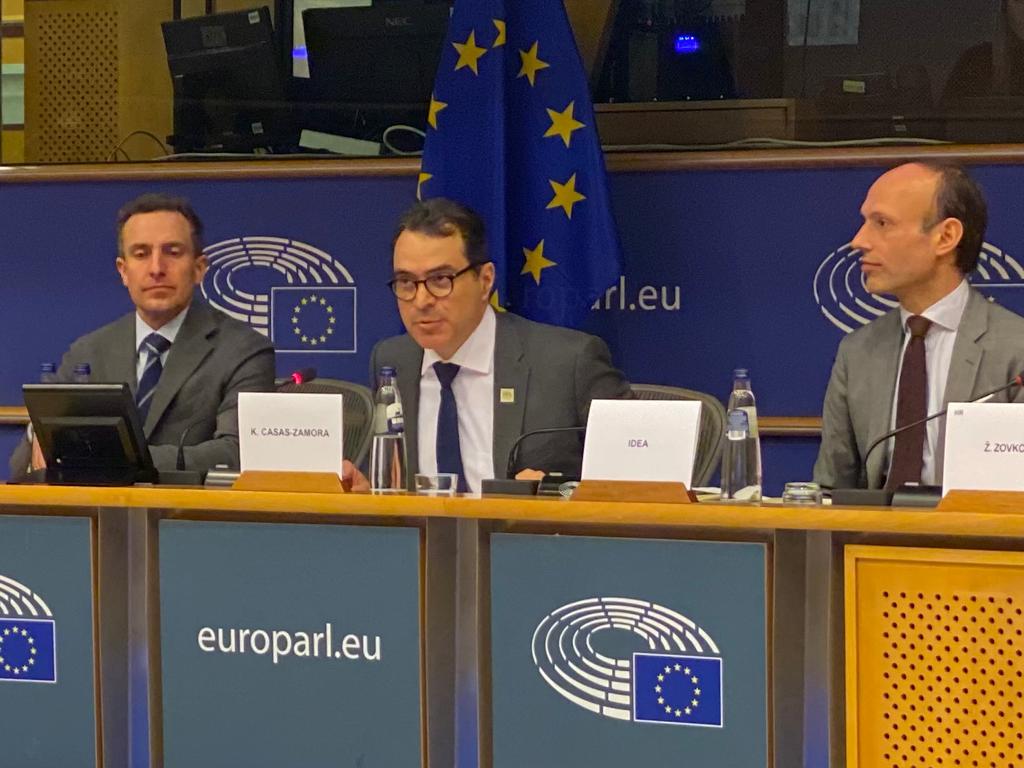International IDEA exchanges views with the European Parliament on EU external democracy action

“The European Parliament has a commendable record of standing up for human rights and democracy, and International IDEA is keen to support that continued effort”.
On 1 March 2023, International IDEA´s Secretary-General Kevin Casas-Zamora exchanged views with the European Parliament on the global state of democracy and the EU´s external democracy action. The debate took place in the framework of a joint meeting of the EP Committee on Development (DEVE), the Committee on Foreign Affairs (AFET) and the Subcommittee on Human Rights (DROI). You can access the recording of the debate here.
The Secretary-General´s remarks were an occasion to present the work that International IDEA is doing to support democracy around the world, to which the EU is a crucial partner and contributor. He also offered some ideas for the EU´s continued democratic leadership, drawing examples from the recently published Recommendations Report 'EU’s External Democracy Action in a New Geopolitical Reality' produced in collaboration with the Swedish Ministry for Foreign Affairs.
“In pursuing the three goals of humility, coherence, and inclusivity—that the EU should embody—the Report acknowledges the Parliament’s role as a critical and vocal actor on democracy and sees space for increased involvement and impact on democracy policy development and implementation.” Read the full speech below.
The DEVE Chair Tomas Tobé and AFET Vice-Chair Željana Zovko introduced the debate highlighting the pertinence of strengthening EU leadership and showcasing the support of democracy worldwide as a political and strategic fight that the EU cannot afford to lose.
Christina Kokkinakis, Deputy Managing Director for Values and Multilateral Relations (European External Action Service) and Chiara Adamo, Acting Director for Governance, Democracy, Gender Equality, Human Rights, (Directorate General for International Partnerships, European Commission) also took part in the debate. They welcomed the timing of the Report produced by International IDEA as it coincides with the Mid Term Review process of the EU Action Plan on Human Rights and Democracy 2020-2024 and kicks off the preparation for the next one. They both subscribed to the recommendation for the EU to build a new narrative, infused by humility. A new narrative that would present democracy as a universal aspiration, a system that delivers and at the same time that defuses the perception of democracy being a Western value. They also both highlighted the priority of supporting the role of women and youth on policymaking as well as strengthening EU external democracy policy coherence.
A rich debate between the three speakers and Members of the European Parliament followed. MEPs Isabel Wiseler Lima, Ilan De Basso, Charles Goerens, Alexander Yordanov and Karsten Lucke intervened. They expressed their support for the EU to develop such a new narrative that reflects the two-way street partnership the EU has with third countries. They also highlighted the importance for the EU to keep protecting and promoting democracy worldwide, as coordinated action of authoritarian actors should be faced by coordinated action from the EU's side.
The DROI Chair Udo Bullmann concluded the debate by stressing some key points: “Humility, cohesion, avoiding of double standards and inclusiveness are the headlines of what EU needs to do.” However, he highlighted the need to continue this reflection not only in the framework of the Action Plan on Human Rights and Democracy but more broadly when discussing the design and implementation of the Global Gateway , as one of the key tools of foreign policy that should reflect the concept of global democracy and be connected to the Sustainable Development Goals. He stressed the need to include this topic in the next Strategic Dialogue that the European Parliament conducts with other EU institutions ahead of the preparations of the State of the Union Address.

KEVIN CASAS-ZAMORA OPENING REMARKS, EXCHANGE OF VIEWS, EUROPEAN PARLIAMENT
Thank you, Chairs, for this kind invitation. I am honored to join you today to speak about the work International IDEA is doing to support democracy around the world, and to offer some ideas for the EU’s continued democratic leadership.
International IDEA is an intergovernmental organization, with 34 Member States from all regions, including 9 Members of the European Union. We were founded in 1995 and have a mandate to support sustainable democracy globally. We have 20 offices around the world, including our Regional Europe Office in Brussels, but we operate in more than 60 countries.
Our work combines knowledge production with capacity development and convening political dialogues with policy advocacy. We have particular expertise in electoral and constitution building processes, political participation and representation, and the assessment of the performance of democracies. Our annual Global State of Democracy Reports are the world’s most comprehensive open-source assessments of democratic performance at country, regional, and global levels.
Throughout this work, the European Union is a crucial partner and leading contributor, for which I am most grateful.
In my short initial remarks today, I would like to do three things. First, I will tell you a bit more about International IDEA’s work around the world. Second, I will present highlights from our report on the EU’s External Democracy Action, produced in support of the Swedish Presidency of the Council of the EU. And third, I will share some brief reflections on why our shared commitment to democracy truly matters today.
From Nigeria to Nepal, International IDEA has a strong and growing collaboration with the EU. Our partnership is rooted in shared values and goals: principles of human rights, self-determination, national sovereignty, and the rule of law. And, of course, the shared belief that democracy is a universal human aspiration worthy of our support, wherever and whenever that support is needed.
On that point, I want to take a moment to highlight our work in the European Neighbourhood. For years, International IDEA and our partners—including the EU— have supported democratic institutions and civil society to advance democracy in Eastern Europe, the Western Balkans and the Caucasus, including in Ukraine, Belarus, Georgia, Moldova, and Albania. We are committed to continuing this work. Among the various needs of a post-war Ukraine, democracy support will be crucial, and we are working with the Ukrainian Parliament to develop options in this regard.
Supporting parliamentary development is indeed an important aspect of International IDEA’s work. International IDEA delivers the INTER PARES project, the EU’s global programme for parliamentary strengthening. INTER PARES is driven by the development priorities and the demands of partner parliaments around the world, delivering peer-to-peer expertise and support from European Union national parliaments and the European Parliament.
This is one of the ways in which our work intersects with the European Parliament. But we are committed to building and broadening this engagement. This Parliament has a commendable record of standing up for human rights and democracy, and we are keen to support that continued effort. We have an exceptional team in Brussels, ready to serve as a first port of call in your work on democracy. Our policy-friendly tools, analysis, and data are ready-made to support your legislative and advocacy efforts. If you require supplemental data or analysis on democracy issues, our experts can also provide this on demand.
And for an example of how we work to encourage and reinforce the democratic efforts of European institutions, including this Parliament, one need look no further than our recent report on the EU’s External Democracy Action.
The production of this Recommendations Report has been an inspiring journey for us, in great collaboration with the Swedish Ministry for Foreign Affairs and with valuable stakeholder input through a comprehensive global consultation.
If there is one key message to draw from this report, it is that the EU should double down on this reputation and grow ever more visible in defending democracy as part of its core identity. I want to highlight three qualities that the report suggests the EU should embody: humility, coherence, and inclusivity.
Humility, because the deterioration in the quality of democracy is global. The debate about how to protect democracy needs to be pluralist, focused on the universality of democratic aspirations and devoid of hegemonic models or pretensions.
Coherence, because the EU should celebrate the centrality of democracy to its identity, while also making sure that the bloc lives up internally to the values it professes.
And inclusivity, because governments cannot protect and advance democracy alone. This effort must be responsive to diversity, including with regards to gender and age. Inclusion should be at the core of the EU’s democracy policymaking and implementation.
In pursuing these three goals of humility, coherence, and inclusivity, the Report acknowledges the Parliament’s role as a critical and vocal actor on democracy and sees space for increased involvement and impact on democracy policy development and implementation.
We hope these recommendations will feed into the upcoming Mid-Term Review of the Action Plan on Human Rights and Democracy.
Let me close by sharing a few further thoughts on this time we are in. The past year has been dire for the world, and for democracy. We have learned that today, in the 21st century, there are governments willing to wage unjust wars to crush democratic values. Meanwhile, polarization and inequalities pull apart democratic communities. Corruption and its perception threaten the credibility of institutions and leaders. Add to all this the existential crisis of climate change, and you have the makings of a witches’ brew.
Despite the real challenges, I am convinced that it is still democracy that provides the tools to solve today’s urgent problems. Democracy has the best chance of forging better social contracts, precisely because of its capacity for self-correction: its ability to adjust policies and procedures, to meet emerging challenges while protecting fundamental rights.
And I know that I am not alone in this conviction. Every day, from Ukraine to Myanmar and Iran, people are standing up for their democratic rights, and showing that democracy is a universal human aspiration.
In the face of daunting challenges, the answer is not to give up on democracy, but to reform it. Most of all, we need to shore up democracy’s ability to solve real problems for real people. And that is what I hope we can continue doing together. Thank you again for having me here today, and I look forward to the discussion.




